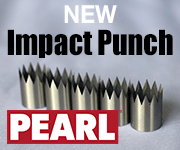At NPE 2003 SPI Promotes Petition to Offset the "China Factor"
- Published: June 25, 2003, By Teresa Koltzenburg, Senior Editor
CHICAGO, IL, USA—NPE 2003 opened Monday here in a finally balmy Chicago. Among the show's most intriguing offerings—besides "the nearly 2,000 companies and more than 1 million net square feet of exhibit space"—was Wednesday's CrossRoads Forum: The China Factor. Sponsored by the Global Business Council (GBC) of the Society of the Plastics Industry Inc. (SPI), in partnership with Plastics Machinery & Auxiliaries and Injection Molding Magazine, the two-and-a-half-hour breakfast meeting was a sellout. In fact, according to Lori Anderson, SPI's strategic planning & industry relations officer, the limited-seating meeting had to be moved twice to larger rooms in McCormick Place in order to accommodate all those interested in attending.
This, and the fact the event kept an almost full house for the forum's duration while the trade show carried on in the halls below, reveals the intense interest in China, the Asian marketplace overall, and how it is affecting manufacturers, including converters and package printers, and manufacturing suppliers alike here in the US.
Leading off the discussion was attorney, political scientist, and author Dr. David Friedman, a Senior Fellow with the New America Foundation. Friedman presented some historical reasons why China is indeed such a "factor," "a threat" (deemed by some), to the US manufacturing base. One such factor was his belief that historically, in order to maintain security, the US government often has traded manufacturing knowledge.
Friedman also addressed how the concept of the "new economy" has factored into the China manufacturing equation. "[There are some] that believe that you don’t have to have an industrial base in order to be a wealthy economy," he says.
Though Friedman did provide some generic, practical hints for those preparing to survey and possibly circumvent the "China factor"—niche-market maintenance and being involved in global economics overall—he encourages plastic industry members to unite, rally, if you will, in order to make their voices and problems heard by US government agencies that regulate trade and manufacturing. At this point, he says, "There is no consensus for major change."
But that could soon change, At the Wednesday morning meeting, SPI’s Lori Anderson announced the launch of a "Plastics Manufacturing Matters!" petition. "At issue—and at risk—is plastics processing, the nation’s fourth-largest manufacturing industry," reads SPI’s letter to possible petition signers:
…For these purposes, the US plastics industry hereby appeals to the nation’s leaders to institute and support the following measures to ensure the future of an integral American industry and to circumvent the loss of technology and capability that is critical to the future of our nation’s economic vitality, military strength, and quality of life:
- Continuous and aggressive negotiations to promote free and fair trade worldwide and to ensure that our trading partners, including China, live up to their obligations under the World Trade Organization.
- Energy initiatives that provide reliable sources of, and reasonable costs for, power for plastics manufacturing.
- US tax policies that encourage capital investment and manufacturing growth in the US
- Tort reform that puts an end to frivolous lawsuits that impede job-creating investments.
- Sensible and meaningful insurance reform that allows employers to provide critical medical or other insurance to employees in a cost-effective manner.
- Implementation of a regulatory regime based on sound science that also protects our workers and the environment.
To sign or for more information about the SPI petition to US government leaders, visit socplas.org/feedback/pmmsurvey.htm.
Aptly named, NPE’s China Crossroads Forum was moderated by James Buonomo, VP, China & India regions at Nypro Inc., and included a panel of individuals representing the supplier side—Randall K. Ash, manager of molding engineering at Delphi Packard Electric Systems; Mark Wall, GE Plastics’ president of its Greater China div.; and Jay Woerner, VP of global manufacturing & sourcing at Milacron Inc.—as well those representing the manufacturers’/trade group side, including Scott Otteman, Director of International Trade Policy at the National Association of Manufacturers (NAM) and Larry G. Sippy, chairman of the National Tooling and Manufacturing Association (NTMA).
More details of the issues and opportunities discussed at the GBC-sponsored "China Factor" forum, as well as other perspectives about China, will be featured in depth in an upcoming article in PFFC. Be sure to check out pffc-online.com—and of course, the print version of Paper, Film & Foil Converter— every month, so you won’t miss this, as well as other important plastics industry news affecting converters and the converting industry.











